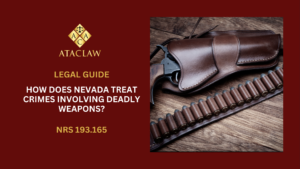In the state of Nevada, the use of a deadly weapon during the commission of a crime is not taken lightly. Understanding the legal implications of this can be daunting. ATAC LAW is here to clarify these complex laws for our readers, particularly focusing on the specifics under NRS §193.165.

Does Using a Weapon During a Felony Lead to Additional Charges or Enhanced Sentencing in Nevada?
When an individual commits a felony utilizing a weapon in Nevada, they are not separately charged for weapon use. Instead, the consequence comes in the form of a heightened sentence for the initial felony conviction. In essence, the act of employing a firearm or any deadly weapon in the perpetration of a crime within Nevada’s jurisdiction does not constitute an independent offense. It is considered an augmentative factor, intensifying the penalties associated with the primary crime committed.
What Are The Consequences of Using a Deadly Weapon during a Felony According to NRS 193.165?
Under Nevada’s NRS 193.165, if a person uses a deadly weapon while carrying out a felony, the sentencing judge has the discretion to extend the sentence for the initial felony by one to twenty (1 – 20) years. Nevertheless, the extension for weapon use cannot surpass the original sentence for the underlying felony.
For instance, if a defendant named John was convicted of mayhem (outlined in NRS 200.280) and given a penalty of 10 years, and a deadly weapon such as a knife was utilized during the felony, the judge, at most, can add 10 years. That means John could face a compounded sentence, serving 10 years for the mayhem and then another 10 for employing a knife during the felony, totaling 20 years.
When determining the length of the enhanced sentence for using a deadly weapon during a crime, a judge in Nevada takes into account five primary factors:
The specifics and surrounding circumstances of the alleged crime.
The criminal history of the defendant.
The consequence the incident had on the victim.
Mitigating factors (like any mental disabilities).
Any other relevant considerations.
It’s important to note that the enhanced sentence for weapon usage is to be served sequentially, not concurrently, with the sentence for the original crime. This means the sentence for using a deadly weapon only starts after the completion of the underlying felony’s sentence.
Furthermore, it is worth noting that a non-citizen found guilty of crimes involving firearms risks deportation. However, a proficient criminal defense lawyer can potentially have the charge dismissed or altered to a non-deportable offense.
Is It Possible to Receive Probation If Convicted of Using a Weapon in Certain Crimes?
If an individual is convicted of employing a weapon while committing specific serious crimes, the courts are restricted from offering probation or suspending the sentence. These crimes include:
Murder, as defined under NRS 200.030,
First-degree Kidnapping, according to NRS 200.310,
Sexual assault, following the stipulations of NRS 200.366, and
Robbery.
In these instances, due to the severity of the offenses compounded with the use of a weapon, the option of probation in place of actual imprisonment is not available. However, for other offenses not listed above, the court might consider the possibility of granting probation instead of incarceration, depending on the circumstances surrounding the case and the discretion of the courts.
For further legal assistance and inquiries, contact ATAC LAW today.
